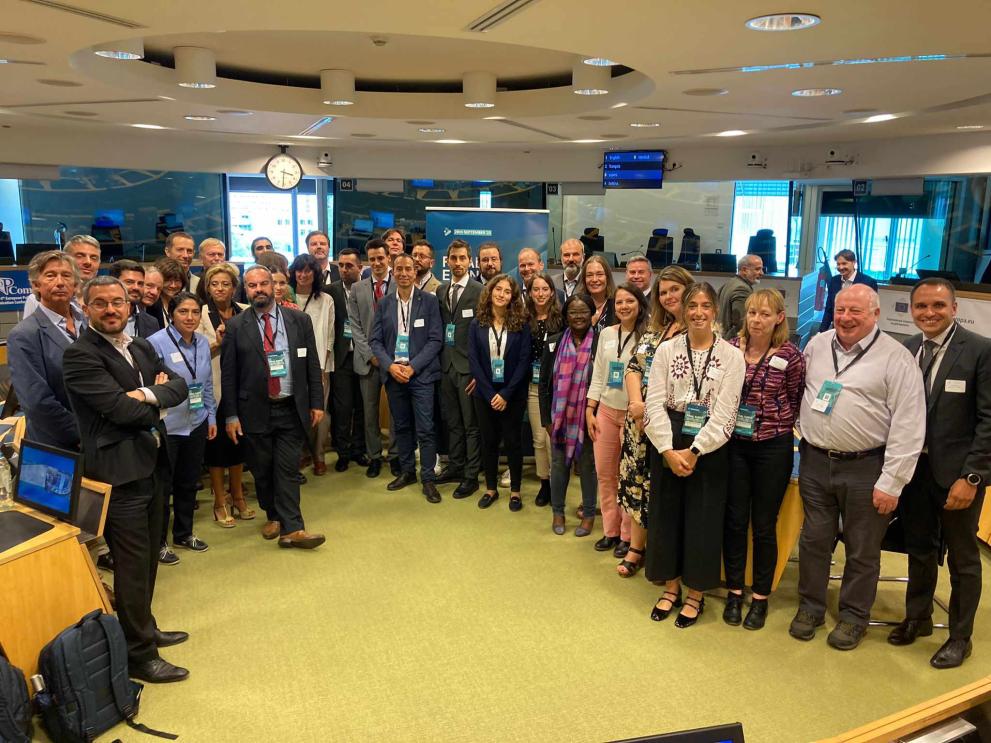
On 26 September 2023, more than 170 people attended the joint Final Event of the COSME-funded pilot-projects “STARS” and “ReStartSMEs”, titled “Advanced Technologies for Resilience and Competitiveness of European more Traditional SMEs. Lessons learnt and Recommendations for Policy Makers from the COSME-funded flagship projects ‘STARS’ and ‘ReStartSMEs’”.
The audience included representatives of EU institutions, cluster organisations, national and regional authorities, research institutions and SMEs.
The hybrid event was hosted at the Committee of the Regions (CoR) and patronised by Eugenio Giani, President of the Tuscany Region and Member of the CoR.
During the event, the two projects STARS and ReStartSMEs shared the key lessons learnt and policy recommendations to further support competitiveness and innovation of the Industrial Ecosystems throughout Europe as well as territorial cohesion.
Highlights of the event
From the European Commission,
Mrs Mariella Masselink, Head of Unit “Industrial Forum, Alliances, Clusters” of the Directorate General for Internal Market, Industry, Entrepreneurship and SMEs (DG GROW) presented the policy context.
Mr Igor Kalinic, Head of Sector “Competitiveness and Internationalisation” of the European Innovation Council and SMEs Executive Agency (EISMEA) presented the role of the Agency in supporting these initiatives.
From the projects,
Representatives presented the highlights and elaborated on lessons learnt and policy recommendations to European, national, and regional policy makers.
| STARS project | ReStartSMEs project |
| Highlights | |
| Lessons learnt | Lessons learnt |
| Policy Recommendations | Policy Recommendations |
SMEs that participated in the projects also provided their testimonials.
From other COSME and Single Market Programme-supported initiatives, further insights were provided by
Ms Anke WIEGAND, Coordinator EEN Berlin-Brandenburg (Germany), EEN Supply Chain Resilience Platform (Belgium), and
Mr Antonio NOVO Antonio, President of European Cluster Alliance, member of the consortium coordinating the European Cluster Collaboration Platform (ECCP) Belgium.
During the event, a graphic artist translated in real-time the main concepts discussed into a graphical recording.
Background information
The “STARS” and “ReStartSMEs” projects were selected under a very competitive call via the COSME EU funding programme, which was set up as an extraordinary action in response to the COVID-19 crisis with the objective to build strategic alliances between tech-savvy SMEs and traditional SMEs - through industrial cluster organisations - aiming at the adoption of advanced technologies.
The STARS project was the answer to the transformation that the European railway sector is living under the ‘pressure’ of transformative innovation roadmaps for 2030, global mega-trends and the heavy impact that Covid-19 had on the mobility-transport ecosystem as well as on the construction one – both of them covering the railway supplies.
The challenging project, coordinated by DITECFER, the Italian Railway Cluster, gathered and orchestrated 17 partners from 14 countries (10 Cluster organisations, 1 Digital Innovation Hub, 5 Technology Centres, 1 Blockchain start-up) to deliver a pilot methodology that can be replicated to ease and accelerate the adoption of advanced technologies by more traditional SMEs, not only of the railway sector.
Among the successful tools piloted during the project implementation:
- the development of a Hackathon format (“Hack&Match”) customised on the needs and ‘capacities’ of SMEs;
- the STARS Blockchain Network offered ‘as a service’ at Technology readiness Level 9 (TRL9), that made it possible for the SMEs to easily and quickly integrate the technology in their use cases;
- the STARS Tutorials, that concretely helped the SMEs learn ‘how to’ concretely operate with a wide range of Advanced Technologies.
At the end of the STARS journey, the technologies mostly adopted to solve the challenges and use-cases of the target SMEs resulted to be Blockchain, IoT, Digital Twin and AI, Big Data.
Engaging traditional manufacturing SMEs in (inter alia European) projects aimed at digital transformation and support can be quite challenging, yet immensely rewarding once successful participation is achieved. Through the implementation of the ReStartSMEs project, which entailed a comprehensive support journey (including a digital maturity assessment, matchmaking, training, and a technology adoption roadmap) we have learned valuable lessons about overcoming participation barriers and ensuring SMEs can benefit fully from such initiatives. These insights have led the project to formulate lessons learned and recommendations that can guide future efforts to effectively engage SMEs in the future.
The ReStartSMEs project highlighted the indispensable role played by clusters in facilitating the digital transformation journey. Clusters act as intermediaries, bridging the gap between SMEs and startups, but also between policy at the regional, national and EU level. To harness their full potential, clusters must adopt a proactive stance. This involves also actively engaging with regional managing authorities, fostering fruitful collaboration with other clusters, and ensuring alignment with EU policies. Developing and implementing common strategies, missions, tools, methodologies, programmes, and funding instruments, all integrated into streamlined processes, are key steps toward enhancing cluster effectiveness.
In addition, the project emphasised the need for a comprehensive approach that extends beyond financial support. While financial backing is undeniably essential, it must be complemented by a suite of supportive measures. This includes integrating SMEs into the broader innovation ecosystem, fortifying their capacity through targeted training and development initiatives, establishing optimal policy frameworks, and providing non-financial support. Such comprehensive support ensures that SMEs receive a well-rounded assistance package tailored to their diverse and evolving needs.
By embracing a collaborative and strategic approach, aligning efforts with regional, national, and EU policies, and continually adapting strategies based on lessons learned and emerging SME requirements, future clusters can help navigate challenges (and crises) effectively and maximise their impact in driving digital transformation and resilience among SMEs.
Details
- Publication date
- 11 October 2023
- Author
- European Innovation Council and SMEs Executive Agency
